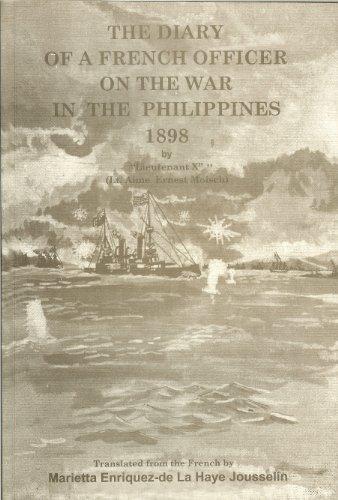Defeat Seen from the Eyes of a Spaniard
I did not dare interrupt or contradict the pilot as he recounted the past events. His gestures were more meaningful than his words.
“We were vanquished by strength, by underhandedness, by bombs, and no more than that. Our honor is safe! Spain’s honor has reached new heights! The Spaniard proved himself once more a knight Spain can be proud of.
“They had everything and we had nothing. Our warships were made of wood, and theirs were of steel. Even our Castilla had been considered for a long time as a mere coaling station because the machinery and the hull of the ship were in such a bad state. The Antonio de Ulloa’s engine was being overhauled in the arsenal. We had to improvise our fleet as we went into battle. Our ships were in this deplorable state while theirs, as you can see, were brand-new, well equipped, fast! This is how we went to battle!
“The two cannons at Sangley Point were not capable of protecting the flag of Spain because their range was too limited. The Yankees had the incalculable advantage of having 36 large cannons at their disposal. The Spaniards did not have a single one. Besides, the maneuvering of our ships was restricted while the Americans enjoyed unimpeded movement.
“The immense superiority of the Americans did not deter us from fighting. They assumed that we would surrender without a fight in keeping with their strategy, a fact they do not dare deny. This is what they believe because they do not understand that the Spanish sailor will risk his life to bestow honor on his country. And in spite of this, they used high explosive shells against this gallant race! They had the insolence to do that!
“We had the gunboat Leyte offshore explore the bay to make sure that we would not be caught by surprise. But the Americans passed in front of her towards midnight. She sighted them, followed them, but lost them in the dark. The Americans succeeded in dodging our badly improvised, useless torpedoes planted hastily at the bottom of the bay. The cannons at the passage, which had to be assembled in 22 days, was taken from the ships under repair. They opened fire, but the darkness of night impeded their vision, preventing them from inflicting any damage on the enemy.
“In Cavite, when the Americans detected the Spanish squadron, they opened fire. They directed their aim to the weakest ships. Everything burst into flames in an instant … Assistance was called to put out the fire, but once it was under control, shelling would start again.
“‘Viva España’ and ‘Viva la Marine’ were on the soldiers’ lips as they fell wounded or dead. A bomb exploded in the mess hall, instantly transforming it into a hospital. When two helmsmen were killed on the Cristina, a staff officer had to man the wheel. When the ship finally sank with all its banners and flags, the Isla de Cuba became the standard bearer.
“Despite his illness, not even for a single moment did the commandant of the Cristina abandon his post. The ship was totally in flames, and ir was impossible to use the cannons. We would all have perished. The admiral ordered us to abandon ship as it sank, still aflame.
“From the beginning of the battle, the Don Juan de Austria had lost its main mast, but continued to fight as it retired to the arsenal.
“The Marquez del Duero, a pygmy of a ship, fought like a Trojan, but sank, riddled with bullets as ordered by the admiral who felt that he should not leave a single one of his ships without a proper burial. At this instant, defense was no longer humanly possible.
“The American squadron, having replenished its munition, which was depleted after two hours of shell-fire, returned to the scene of battle, and –the scoundrels!– began to fire once more on the sinking, defenseless ships. What infamy! The Spaniards do not wage war like this!
“The Spanish sailors fought more bravely than anyone can believe. The English consul paid us homage by acknowledging our bravery. Even the commandant of the Raleigh declared that if we had a single battleship in Corregidor, a ferocious battle would have ensued, and that if we had displayed the same courage as we did in Cuba, the Americans would have paid dearly for their victory!
“Spain may not be strongest, but she is always the proudest!”
I uttered no comment on this ridiculously pompous narrative so enthusiastically delivered: men firing cannons although not seeing well enough in the dark to fire, and the ship withdrawing to the arsenal in order to continue fighting. Even the sailors considered this tale absurd.
